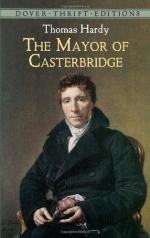Sentimentally she did not much care to see him—his delays had wearied her, but it was necessary; and with a sigh she arranged herself picturesquely in the chair; first this way, then that; next so that the light fell over her head. Next she flung herself on the couch in the cyma-recta curve which so became her, and with her arm over her brow looked towards the door. This, she decided, was the best position after all, and thus she remained till a man’s step was heard on the stairs. Whereupon Lucetta, forgetting her curve (for Nature was too strong for Art as yet), jumped up and ran and hid herself behind one of the window-curtains in a freak of timidity. In spite of the waning of passion the situation was an agitating one—she had not seen Henchard since his (supposed) temporary parting from her in Jersey.
She could hear the servant showing the visitor into the room, shutting the door upon him, and leaving as if to go and look for her mistress. Lucetta flung back the curtain with a nervous greeting. The man before her was not Henchard.
23.
A conjecture that her visitor might be some other person had, indeed, flashed through Lucetta’s mind when she was on the point of bursting out; but it was just too late to recede.
He was years younger than the Mayor of Casterbridge; fair, fresh, and slenderly handsome. He wore genteel cloth leggings with white buttons, polished boots with infinite lace holes, light cord breeches under a black velveteen coat and waistcoat; and he had a silver-topped switch in his hand. Lucetta blushed, and said with a curious mixture of pout and laugh on her face—“O, I’ve made a mistake!”
The visitor, on the contrary, did not laugh half a wrinkle.
“But I’m very sorry!” he said, in deprecating tones. “I came and I inquired for Miss Henchard, and they showed me up here, and in no case would I have caught ye so unmannerly if I had known!”
“I was the unmannerly one,” she said.
“But is it that I have come to the wrong house, madam?” said Mr. Farfrae, blinking a little in his bewilderment and nervously tapping his legging with his switch.
“O no, sir,—sit down. You must come and sit down now you are here,” replied Lucetta kindly, to relieve his embarrassment. “Miss Henchard will be here directly.”
Now this was not strictly true; but that something about the young man—that hyperborean crispness, stringency, and charm, as of a well-braced musical instrument, which had awakened the interest of Henchard, and of Elizabeth-Jane and of the Three Mariners’ jovial crew, at sight, made his unexpected presence here attractive to Lucetta. He hesitated, looked at the chair, thought there was no danger in it (though there was), and sat down.




